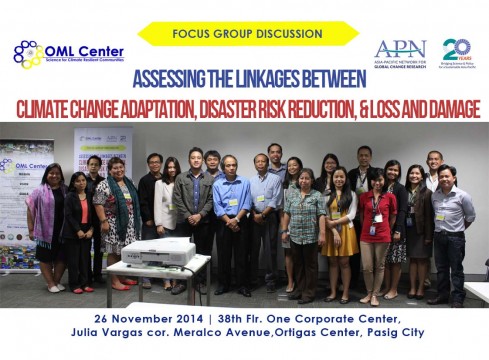Focus Group Discussion on Assessing the Linkages between CCA, DRR, and L&D

The OML Center presented at the 1st WCRP-CORDEX Science and Training Workshop in Bogor, Indonesia
December 9, 2016
Round Table Discussion on Coastal Ecosystems Rehabilitation and Management
December 9, 2016The OML Center organized a focus group discussion for the project entitled “Assessing the Linkages between Climate Change Adaptation, Disaster Risk Reduction, and Loss and Damage” last November 26, 2014 at the 38th Flr., One Corporate Center, Julia Vargas cor. Meralco Ave., Ortigas Center, Pasig City. This is a regional project funded by the Asia-Pacific Network for Global Change Research (APN) with collaborators from other Southeast Asian countries such as Cambodia, Indonesia, Vietnam, and Thailand.
This FGD gathered 17 experts from different government agencies, local government unit, non-government organizations, research and academic institutions. They were consulted regarding the challenges and gaps in loss and damage assessment, and its possible linkages to climate change adaptation and disaster risk reduction.
Mr. Arturo Valdez, OML Center Board of Trustees member, welcomed the participants by sharing his various experiences while stressing the importance of science and local expertise in causes such as addressing the issue of loss and damage. After his message, Dr. Rodel Lasco, OML Center Scientific Director, presented the initial findings of the project such as the existing systems and tools, and issues and gaps, among others. He also showed the proposed framework that links climate change adaptation and disaster risk reduction to loss and damage. This framework aims to create a holistic approach to assess the importance of loss and damage knowledge for policy-making and effective action. It also presents the idea of loss and damage assessment as a cyclical approach rather than static.
During the focus group discussion proper, the participants shared their knowledge and opinions on the following questions:
1. What particular tool or approach do you use in loss and damage assessment?
2. Who are the key actors in loss and damage assessment?
3. What are the factors to be considered in monitoring and evaluating loss and damage systems?
4. How do you mainstream an effective loss and damage systems?
5. What do you think are the emerging issues, gaps and opportunities in tackling loss and damage?
6. In what ways can we link loss and damage to climate change adaptation and disaster risk management?
7. What are the important factors to be considered in developing an institutional framework of assessing loss and damage associated with climate change at various scales (global, regional, national, community) and preventing future losses and damages?
8. What are the needed climate information and knowledge to support effective loss and damage systems?
The results of the discussion will be used for the improvement of the paper and framework that the team is currently writing.
To view the photos during the FGD, click here.

